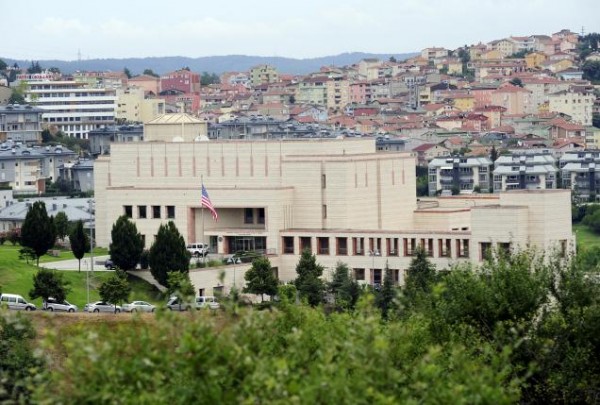
Turkey has seen a sharp spike in clashes between security forces and rebels of the Kurdistan Workers’ Party, or PKK, in the a wake of its campaign against PKK targets in Iraq in tandem with airstrikes against Islamic State militants in Syria. Hundreds of suspected militants have also been rounded up at home.
No one was hurt in the attack on the U.S. Consulate, which came just weeks after Turkey agreed to take a more active role in the U.S.-led campaign against the Islamic State group and to allow the U.S.-led coalition to use its bases in the fight against IS. On Sunday, the U.S. military announced that a detachment of six F-16 fighter jets and some 300 personnel had arrived at Turkey’s southern Incirlik Air Base.
A far-left group that carried out a 2013 suicide bombing on the U.S. Embassy in Ankara claimed it was involved in the attack.
Both assailants fled, and one was later shot and taken into custody. The Revolutionary People’s Liberation Army-Front, or DHKP-C identified her as 51-year-old Hatice Asik and said she was a member of the group, which is considered a terrorist organization by the U.S. and Turkey. The other assailant was still at large.
In a statement on its website the group described Asik as a “revolutionary” fighting American oppression and vowed to maintain its struggle until Turkey is “cleared” of all U.S. bases on its territory.
Turkey’s Foreign Ministry condemned the attack and said security at U.S. missions around the country had been increased. It said Turkey was determined to fight terrorism through “cooperation and solidarity” with its NATO ally.
In Washington, State Department Spokesman John Kirby said U.S. officials were working with Turkish authorities to investigate the incident. He said the consulate would reopen for business on Tuesday.
Hours after the attack, police wearing flak jackets and holding machine guns blocked off streets leading to the consulate. The building, which is surrounded by fortified walls, was intact and its flag was flying.
Earlier Monday, an overnight bomb attack at a police station in Istanbul injured three policemen and seven civilians and caused a fire that collapsed part of the three-story building. The suspected bomber was killed during the explosion, according to the Istanbul governor’s office.
Unknown assailants later fired on police inspecting the scene of the explosion, sparking another gunfight with police that killed a police officer and two assailants. There was no immediate claim of responsibility for the attack, but the state-run Anadolu Agency, quoting unnamed police sources, said it was carried out by the PKK.
Meanwhile, violence intensified between security forces and Kurdish rebels in the mainly Kurdish southeast on Monday, where rebels in the province of Sirnak fired at a helicopter carrying conscripts, killing one and injuring another, the military said.
Four policemen were also killed in Sirnak when their armored vehicle was attacked with a roadside bomb, the Dogan news agency reported.
Turkey last month carried out a major security sweep, detaining some 1,300 people suspected of links to banned organizations, including the PKK, the DHKP-C and extremists of the Islamic State group.
Turkey has recently started taking a more active role against IS militants. Last month it conducted aerial strikes against IS positions in Syria and agreed to let the U.S.-led coalition use its bases for its fight against IS.
In Washington, a Pentagon spokesman, Navy Capt. Jeff Davis, said Monday that U.S. F-16 fighters brought to Turkey a day earlier were expected to begin flying combat missions “in coming days,” and that the U.S. might also bring refueling aircraft to the country’s Incirlik base at some point. Davis said the U.S. likely will deploy combat search-and-rescue teams to Turkey as a routine contingency force for responding to the downing of an F-16 or other U.S. aircraft in hostile territory.
The DHKP-C, has carried out assassinations and bombings since the 1970s. It claimed responsibility for a 2013 suicide attack on the U.S. Embassy in Ankara, which killed a Turkish security guard. The DHKP-C and the PKK both have Marxist origins and have cooperated in the past, though there was no immediate indication of PKK involvement in the attack on the consulate.
Other recent attacks by the DHKP-C have included on the headquarters of a political party and the Turkish Ministry of Justice. The group, which wants to set up a socialist state in Turkey, advocates a Marxist-Leninist ideology and opposes the U.S. and Turkish governments, as well as NATO.
ASSOCIATED PRESS

Leave a Reply
You must be logged in to post a comment.